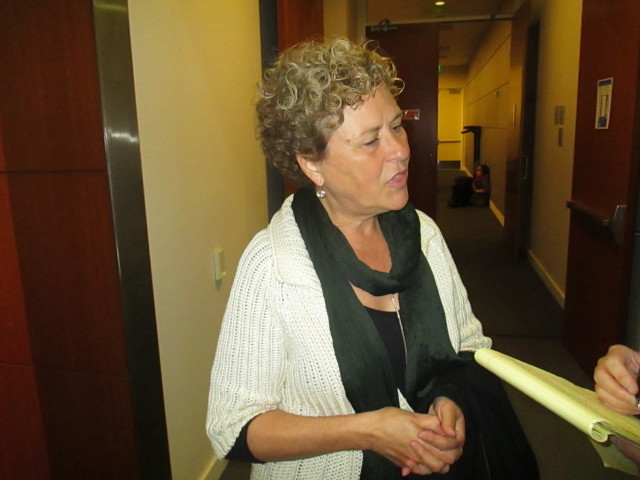When is it “political games” and when is it political reality? And it’s fun to see the mayor praising Chris Daly, who did exactly the opposite of what the Lee administration has done (and it worked)

By Tim Redmond
MAY 4, 2015 – I like it when Ed Lee is out there praising Chris Daly.
Well, not directly, of course, but the mayor had to acknowledge the role the former supervisor played in making it possible for a youth organization that fights violence (and like most nonprofits of its sort, doesn’t have a lot of money) to buy a building and create a more stable future.
Here’s the key point, and it’s one that the mayor ought to be taking to heart: Daly forced big developers to kick in money – quite a lot of money – to create a Community Stabilization Fund in Soma. The deal allowed for the construction of the Rincon Tower highrise luxury condos, which are an ugly plague on the skyline and part of everything that it wrong with the city’s housing policy. But at the time, Daly told me he didn’t think he could halt the project – so he shook the developers down for everything he could get. In the name of doing what is so important these days – stabilizing existing communities.
Here’s the Chron report:
At the celebration [Lee] said that the stabilization fund, which was set up by former Supervisor Chris Daly was an acknowledgment that small community groups like United Playaz could easily become victims in a rapidly rising real estate market.
“We realized that change was coming about, and if the neighborhood nonprofits were going to prevent themselves from being victimized by the market they would have to figure this out quickly,” Lee said.
No: Ed Lee had nothing to do with the stabilization fund. In fact, he did the exact opposite.
The Twitter tax break allowed at least one company to avoid more than $30 million in city taxes. There was no “community stabilization fund” in the package, just some largely bogus “community benefits agreements.”
As a result of the tax break, nonprofits who have made their homes for years in mid-Market, and who serve populations in mid-Market, are facing displacement as rents soar. Tech companies can pay a lot more than community-based organizations.
So the United Playaz gets to stay, which is nice. But so many others are getting forced out thanks to the Twitter tax break. And there is no stabilization fund for them.
Every day, I do the right thing and tell my teenage daughter to take shorter showers, and flush the toilet only when necessary, and all the other things we do in a California drought. And then, of course, I read this – and wonder why I even bother.
On the desert-like west side of the San Joaquin Valley, almond orchards stretch as far as the eye can see. But this nut empire is a relative newcomer to the neighborhood: in the past five years, skyrocketing global demand for the cash crop has enabled it to double in size and become the second-biggest water consuming crop in California. The arid climate and selenium-laced soils in this region make it a kind of madness to grow this thirsty crop here, where it takes more than double the water to grow almonds than in Northern California. Agribusiness giants like Beverly Hills-based billionaire Stewart Resnick are raking in profits from these crops, about seventy percent of which are exported overseas. The Westlands Water District, where many of these orchards are based, has pumped more than one-million acre feet of groundwater in the past two years – more water than Los Angeles, San Diego and San Francisco combined use in a whole year – to produce these nuts, threatening the region’s water supply, and causing the ground to sink as much as a foot per year in some places. What’s more, most of this crop is exported abroad—meaning, effectively, the water is exported along with it.
Of course we should all conserve water. San Francisco drinks Hetch Hetchy, none of which goes to agribusiness in the desert – and we still have to worry about having enough for the future.
But at some point, don’t we have to ask why we are growing almonds (and rice, and tomatoes) in the desert?
The big event of this week is the May 8 rally where community groups from the Mission will head to City Hall to demand an end to the evictions and a chance to slow down the pace of market-rate housing development in the neighborhood.
I walked from the east side of 24th Street to Valencia and 16 last week with a Canadian radio reporter, who made it clear to me that the fate of the Mission is becoming an international story (his piece, for a Montreal station, will be in French).
And I told him that what I’m hearing from people in the community is not only anger and fear – which pervades San Francisco these days, particularly among anyone who rents a home or a commercial space – but the need for a bit of a time out.
Change always happens in cities, and it happens in the Mission, too, and it’s been happening for a long time. But right now it’s happening so fast that it’s breathtaking – thousands are getting evicted, while apartments on Valencia rent for $10,000 a month. Merchants on 24th Street are terrified that they will lose their leases so another high-end restaurant can come in and turn what’s left of the un-gentrified Mission into another Valencia St.
So what the merchants and residents want, among other things, is a chance for the city to take a deep breath and decide: Do we really want more condos for millionaires in the Mission? How many more new restaurants can we handle? Is there more we can do to stop the evictions, both commercial and residential?
Can we get the illegal tech office creep under control?
How do we save the Mission?
That’s why Sup. David Campos is talking about a short-term moratorium on new development.
The May 8 event starts at noon, but organizers are expecting a large crowd and urge people to get their early. Show up at 11, on the steps of City Hall.
When Julie Christensen, Mayor Lee’s appointee who is up for re-election, and Sups. Mark Farrell and Malia Cohen, who are not known as the most tenant-friendly members of the board, call for a hearing on preserving rent-controlled housing, I have to pause.
But that’s what’s happening Monday/4 when the Land Use and Transportation Committee holds a hearing on the topic. The Council of Community Housing Organizations will be there, along with the Mayor’s Office of Housing.
I wonder if Lee and his allies will finally come around to the idea that we aren’t going to get any relief at the state level – and that the future of rent-controlled housing in San Francisco, and the prevention of no-fault evictions, and the end of speculation, may have to be something we figure out right here at home.
The deeper politics, of course, have to do with the District3, race, where Aaron Peskin, a longtime supporter or rent control and tenant rights, is facing off against Christensen, who is walking the political tightrope of siding with the mayor and his big-money folks while trying to be a supervisor for the people.
It all came to a head when the Sing Tao Daily reporter, and my friend Joe Fitzgerald Rodriguez repeated, comments that Christensen apparently made to a housing meeting. She suggested that rent control was one of the reasons for the housing crisis.
That’s not a great thing to say in San Francisco right now, where rent control is the only thing standing between, oh, maybe 250,000 San Franciscans and a one-way ticket to another city.
So now Christensen is backing off, with an oped in the Examiner talking about “politicizing housing.” Let me quote some passages:
Recently, in a meeting with housing advocates, I pointed out that as a consequence of not having enough affordable housing, sometimes renters can be reluctant to move, even when their current housing situation no longer meets their needs. Understandably, the prospect of leaving any unit that is affordable, when affordable housing is in short supply and rents continue to rise, is daunting.
Unfortunately, some saw this conversation as an opportunity to score political points by misrepresenting my position. Let me be very clear: I support rent control in San Francisco, have always supported rent control and will continue to fight to protect rent control. This housing affordability crisis is real. Playing political games instead of finding solutions isn’t going to keep people in their homes or provide more housing options that they can afford.
I have heard this message since the early 1980s, when landlord groups said that rent control was creating “overhousing.” People who had three-bedroom flats and had raised their kids and sent them off to college and careers weren’t moving to smaller units (and making the bigger ones available) because they had rent control.
Of course, if we had rent controls on vacant apartments – which the same people who raised this argument fought bitterly and wound up outlawing – this wouldn’t be an issue, would it?
Meanwhile, “daunting” is the wrong word. The right word is “impossible.” And this isn’t random market forces – this is the result in part of Mayor Ed Lee’s policies of bringing thousands of high-paid tech jobs to town without first (and FIRST matters) creating any housing for the people who would work in those jobs.
Let’s go back: “Playing political games instead of finding solutions isn’t going to keep people in their homes.”
I guess that means that tenant groups shouldn’t criticize an elected official who says things that are counter to the interests of tenants.
I dunno. I’m all for solutions. But the landlord groups have made it clear that they are not willing to accept anything that might actually work (where was the SF Board of Realtors on Ellis Act reform?) so there isn’t going to be what the mayor and his allies like Christensen call “consensus.”
It’s going to be politics – us vs. them politics – and that’s not a game. That’s reality.




